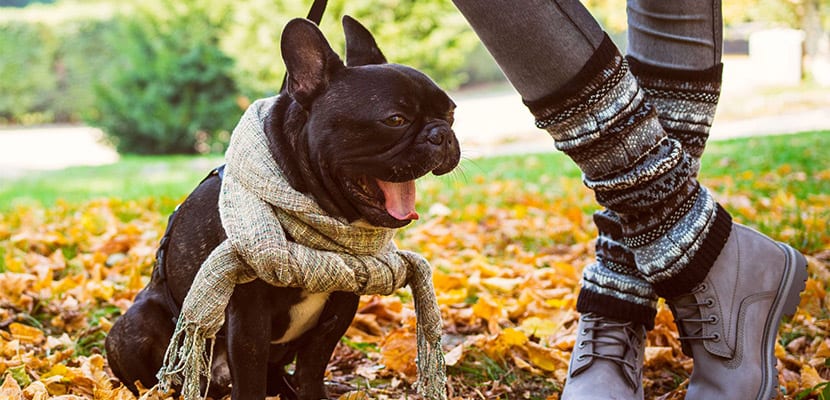
La bronchitis in dogs It is basically the inflammation of the bronchial tubes located in the lungs, which makes it difficult to breathe and creates a persistent and severe cough. Today we will see what is bronchitis in dogs, what types of bronchitis there may be, how to recognize it, treatments and prevention. As in any disease, when in doubt we must go quickly to a veterinarian to carry out the relevant tests in each case.
Bronchitis in dogs is a disease that is not serious, but it does reduce the quality of life of the dog and can even become chronic. That is why, like any other disease, it must be treated effectively to get the dog to fully recover.
What is bronchitis?
The bronchi are the branches of the trachea that allow air to enter and leave the lungs. Bronchitis is precisely the inflammation and infection of these bronchi, causing the lungs to malfunction and breathing with difficulty, leading to a persistent cough. This infection can be caused by viruses or bacteria at a certain time, or it can be a genetic predisposition of the dog, which will make us distinguish between the types of bronchitis.
Different types of bronchitis

There are two forms of canine bronchitis. On one side is the acute bronchitis, which is a type of bronchitis that occurs at a certain time due to a viral or bacterial infection. This type of bronchitis lasts a few weeks and subsides after treatment so that it does not reappear unless there is another infection of this type. In acute bronchitis we are talking about dogs that have a predisposition to have this disease and that develop it throughout their lives, without completely withdrawing. The chronic bronchitis it is more durable, can go on for months and easily reoccur. There are breeds more prone to this type of problem and among them is the Poodle, the Yorkshire or the Chihuahua.
Symptoms of bronchitis in dogs
There are symptoms that are usually common in bronchitis in dogs. One of them is the persistent cough that can range from moderate to severe depending on the moment in which the disease is found. They have trouble breathing and make lung sounds. This cough can occur after exercising or persist under normal conditions. In addition, it is common for the dog to have a fever due to the lung infection, although this type of symptom does not always occur. It is usually a dry cough although sometimes it involves a runny nose and mucus. In general, these are symptoms that can be confused with many other diseases, so it is necessary to consult a professional before treating.
What should we do
Whatever the diagnosis, if we see that our dog has a fever, mucus and a lot of cough, what will proceed in any case is to go quickly to the vet. There are diseases, such as kennel cough, that can lead to serious clinical cases, so it is very important to find the type of disease and give the dog the necessary care as soon as possible. In the vet will take your symptoms into account and run some tests. Bronchitis is easy for a vet to conclude. In this case, they will try to determine the cause to learn more about the treatment we should give you. We may not know the cause and may conclude that it is caused by bacterial infection, allergy, or diarrhea. If the case of the dog is serious, various tests can be done, including a lung x-ray, a biopsy, a bronchopulmonary cytology or a bronchoscopy.
Treatment for bronchitis
As in many other diseases, bronchitis treatment focuses on symptoms, since it is a disease that cannot be fought directly. Bronchitis is evaluated in each dog in a different way, leading to a diagnosis, not only of the disease, but also of the general condition of the dog. A disease is different in a healthy young dog than in a puppy or an older dog.
In treatments for bronchitis bronchodilators are often used to help the dog breathe better. In general, they are usually provided by inhalation, although there are also in medicines. Antibiotics will be used to fight the infection and the dog may need to take some fever medication as well. As we say, each veterinarian must diagnose the dog in a particular way and apply treatments according to its state of health and the progress of the disease. In some cases, the weakness of the dog means that intravenous medications have to be applied.
Prevent canine bronchitis
Canine brochitis is difficult to prevent, as sometimes the cause is unknown, which may be due to a genetic predisposition. But you should always avoid anything that irritates the animal's respiratory tract, from smoke to smoking near the dog, aerosols or perfumes. We do not claim that this will prevent brochitis entirely, but it will at least decrease the risk of the dog having breathing problems.
Natural remedies for bronchitis
As for natural remedies, we can talk about a few, but you always have to consult a veterinarian. One of the remedies that are often used with animals is that of honey, because it has antibiotic power and soothes the throat, providing immediate relief from irritation due to coughing. You do not have to give the dog large amounts, as it is a food with sugar, but with a small spoonful we can help him cough a little less.
Another remedy consists of dilute a few tablespoons of coconut oil in your water. Coconut oil relieves bronchitis cough and improves the dog's immune system, making it a good aid in his recovery process. The problem is that they may not be as likely to drink coconut-scented water, something that is easy with honey because they tend to like it.

Very good information about bronchitis in dogs, it has helped me a lot